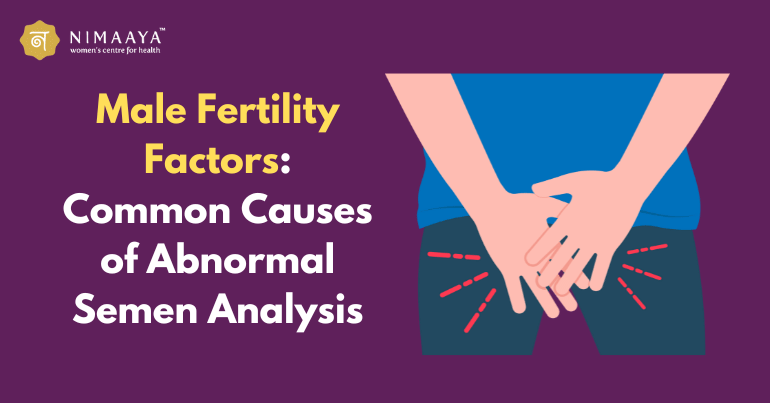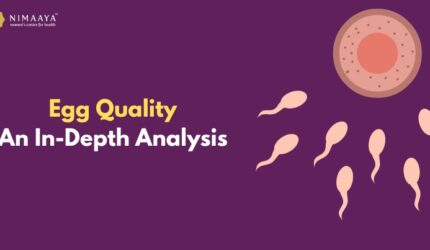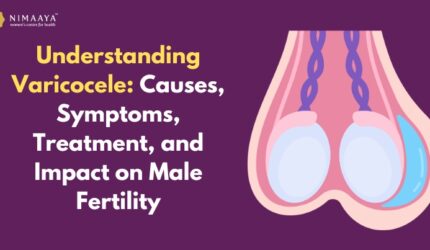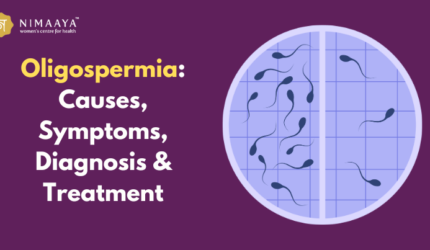Introduction
Male fertility factors play a critical role in a couple’s ability to conceive. While much attention is often given to female infertility, it’s essential to understand that male infertility is just as prevalent. Understanding the various causes of abnormal semen analysis can help men take proactive steps toward improving their reproductive health. This article delves into the common factors affecting male fertility, exploring lifestyle influences, health conditions, and environmental factors. If you or someone you know is dealing with fertility issues, this guide will provide valuable insights and potential treatment options.
Understanding Male Fertility Factors

Understanding the male factor infertility meaning and male factor infertility definition is crucial in comprehending the broader spectrum of male fertility factors. These factors encompass various elements that can influence a man’s ability to father a child, including genetic, environmental, lifestyle-related, and health-related issues. Male fertility factors encompass a broad spectrum of elements that can influence a man’s ability to father a child. These factors can be classified into various categories, including genetic, environmental, lifestyle-related, and health-related issues. By understanding these factors, individuals and couples can seek appropriate interventions and treatments to improve their chances of conception.
Also Read: Male Infertility: Causes, Diagnosis, and Treatment Options
Causes of Abnormal Semen Analysis or Male Infertility
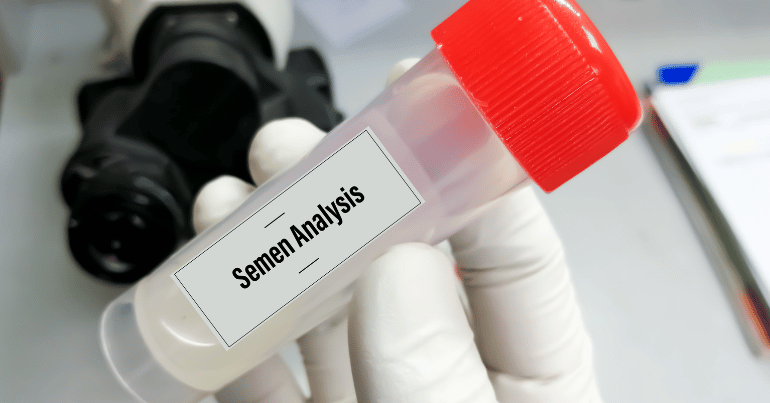
Understanding male infertility causes which can lead to abnormal semen analysis results, is pivotal for diagnosing and addressing fertility issues effectively. Abnormal semen analysis results often reveal underlying problems that can impact a man’s ability to conceive. These causes can be broadly categorized into lifestyle factors, health conditions, and environmental influences.
Lifestyle Factors:
-
Smoking and Substance Abuse
One of the primary lifestyle-related causes of male infertility is smoking. Cigarette smoke contains toxins that can damage sperm DNA, reduce sperm count, and impair motility. Similarly, excessive alcohol consumption can disrupt hormone levels essential for sperm production and lead to erectile dysfunction. Recreational drug use, including marijuana and anabolic steroids, also negatively affects sperm health and overall fertility.
-
Diet and Exercise
Poor dietary habits and lack of exercise contribute significantly to infertility. A diet high in processed foods and low in essential nutrients can reduce sperm quality. Obesity, a result of unhealthy eating and sedentary lifestyles, is linked to decreased testosterone levels and impaired sperm production. Conversely, maintaining a balanced diet rich in antioxidants and engaging in regular physical activity can enhance sperm health.
Health Conditions:
-
Varicocele
Varicocele, an enlargement of veins within the scrotum, is a common health condition linked to causes of male infertility. This condition raises the temperature in the testicles, which can adversely affect sperm production and function. Surgical intervention can often improve fertility outcomes for men with varicocele.
-
Infections
Infections, particularly sexually transmitted infections (STIs), can cause inflammation and blockages in the reproductive tract, leading to male infertility. Conditions such as epididymitis and prostatitis can damage sperm ducts and reduce sperm quality. Prompt treatment of infections is crucial to prevent long-term fertility issues.
-
Hormonal Imbalances
Hormonal imbalances, including low testosterone levels, can interfere with sperm production. Conditions such as hypogonadism, where the body produces insufficient testosterone, can significantly impact fertility. Hormone replacement therapy and medications can help restore hormonal balance and improve sperm quality.
-
Ejaculation Issues
Problems such as retrograde ejaculation, where semen enters the bladder instead of exiting through the penis, can prevent sperm from reaching the egg. This can be caused by diabetes, spinal injuries, or surgery.
-
Chronic Diseases
Conditions like diabetes, kidney disease, and liver disease can affect fertility. These diseases often lead to hormonal imbalances and impaired sperm production.
Environmental Influences:
-
Exposure to Toxins
Environmental toxins are significant causes of male infertility. Men exposed to pesticides, heavy metals, and radiation face a higher risk of abnormal semen analysis results. These substances can damage the DNA in sperm cells, reduce sperm count, and impair motility. Men working in industries with high exposure to these toxins should take protective measures and undergo regular health screenings.
-
Heat Exposure
Excessive heat exposure can impair sperm production and function. Regular use of hot tubs, saunas, and tight clothing that increases scrotal temperature can negatively affect fertility. Men should avoid prolonged heat exposure to maintain optimal sperm health.
-
Pollution
Air and water pollution can introduce harmful chemicals into the body, affecting overall health and sperm quality. Heavy metals like lead and mercury, commonly found in polluted environments, are particularly harmful to sperm health.
Psychological Factors:
-
Stress and Anxiety
Chronic stress and anxiety are often overlooked but significant causes of male infertility. High stress levels can disrupt hormone production and reduce sperm quality. Stress management techniques, including meditation, counseling, and regular exercise, can help alleviate these effects and improve fertility.
-
Mental Health Disorders
Mental health disorders, such as depression, can impact sexual function and overall reproductive health. Medications for these conditions may also have side effects that affect fertility. Seeking comprehensive treatment for mental health issues and discussing potential side effects with healthcare providers is essential.
Genetic Factors:
Genetic abnormalities can also contribute to male infertility. Conditions such as Klinefelter syndrome (an extra X chromosome), Y chromosome deletions, and genetic defects impacting sperm production or function underline the genetic component in fertility challenges. Genetic testing may be recommended in cases of unexplained infertility or recurrent pregnancy loss.
Understanding the various male infertility causes is the first step in addressing fertility issues. Lifestyle modifications, medical interventions, and environmental adjustments can significantly improve semen analysis results and enhance the chances of conception. By recognizing and addressing these factors, men can take proactive steps towards improving their male fertility factors, reproductive health, and achieving their parenthood goals.
Also Read: Understanding Male Infertility Symptoms: What You Need to Know
Exploring Male Infertility Types

When delving into the types of male infertility, it’s essential to understand the various conditions and male fertility factors that can hinder a man’s ability to father a child. Male infertility encompasses several distinct types, each characterized by specific abnormalities in sperm production, function, or delivery. These issues can be broadly categorized into sperm production disorders, sperm transport problems, and functional issues, each with unique underlying causes and implications.
Sperm Production Disorders:
One of the primary male infertility types involves disorders in sperm production. These disorders can manifest as:
-
Azoospermia
Azoospermia is a condition where no sperm cells are present in the semen. It can be either obstructive, where there is a blockage preventing sperm from entering the ejaculate, or non-obstructive, where there is an issue with sperm production itself. Obstructive azoospermia can result from congenital issues, infections, or surgical complications, while non-obstructive azoospermia is often related to genetic conditions, hormonal imbalances, or damage to the testicular tissue.
-
Oligospermia
A low sperm count in the ejaculate is referred to as oligospermia. This condition can be caused by various factors, including hormonal disturbances, testicular varicocele, infections, or exposure to environmental toxins. Men with oligospermia may still produce sperm, but the reduced quantity can significantly decrease the likelihood of successful fertilization.
-
Teratozoospermia
Teratozoospermia is characterized by a high percentage of abnormally shaped sperm. Normal sperm morphology is crucial for the sperm to effectively reach and fertilize the egg. Factors contributing to teratozoospermia include genetic defects, exposure to harmful substances, and certain health conditions. Abnormal sperm morphology can impede the sperm’s ability to swim efficiently or penetrate the egg.
-
Asthenozoospermia
Asthenozoospermia involves poor sperm motility, meaning the sperm have a reduced ability to swim towards the egg. This condition can result from structural defects in the sperm’s tail, infections, or oxidative stress caused by lifestyle factors such as smoking or poor diet. Reduced motility significantly impacts the sperm’s ability to reach and fertilize the egg, making conception more challenging.
Sperm Transport Problems:
Another significant category in the male infertility types involves issues with sperm transport. These problems prevent sperm from being effectively ejaculated during intercourse.
-
Ejaculatory Duct Obstruction
An obstruction in the ejaculatory ducts can prevent sperm from being mixed with seminal fluid, leading to a dry or low-volume ejaculation. This condition can be caused by congenital abnormalities, infections, or surgical scarring. Treatment often involves surgical intervention to remove the blockage and restore normal ejaculation.
-
Retrograde Ejaculation
Retrograde ejaculation occurs when semen is ejaculated backward into the bladder instead of out through the penis. This condition can result from surgeries, medications, or neurological disorders that affect the nerves and muscles involved in ejaculation. Men with retrograde ejaculation may notice little or no semen during ejaculation, although sperm may still be present in the urine.
Functional Issues:
Functional issues represent another type of male infertility where the problem lies in the function of the reproductive organs or the sperm itself.
-
Hormonal Imbalances
Hormonal imbalances, such as low levels of testosterone or elevated levels of prolactin, can disrupt sperm production and function. Conditions like hypogonadism or pituitary gland disorders can lead to such imbalances. Hormone replacement therapy or medications to correct these imbalances can often improve fertility outcomes.
-
Genetic Conditions
Certain genetic conditions can directly impact sperm production and function. Klinefelter syndrome, for example, involves an extra X chromosome in males, leading to impaired testicular function and reduced sperm production. Genetic testing can help identify these conditions, guiding appropriate treatment or assisted reproductive techniques.
-
Immunological Infertility
In some cases, a man’s immune system may produce antibodies that attack his own sperm, treating them as foreign invaders. This immunological response can reduce sperm motility and prevent them from effectively fertilizing an egg. Treatments may include immunosuppressive therapies or assisted reproductive technologies to bypass these immune barriers.
Understanding the different types of male infertility is crucial for diagnosing and addressing the underlying causes effectively. From sperm production disorders to transport problems and functional issues, each type presents unique challenges and requires tailored treatment approaches. Advances in medical science, including genetic testing and assisted reproductive technologies, offer hope for men facing these infertility challenges. By identifying and treating the specific type of infertility, men can significantly improve their chances of achieving successful conception and realizing their dream of parenthood.
Treatment Options for Male Infertility
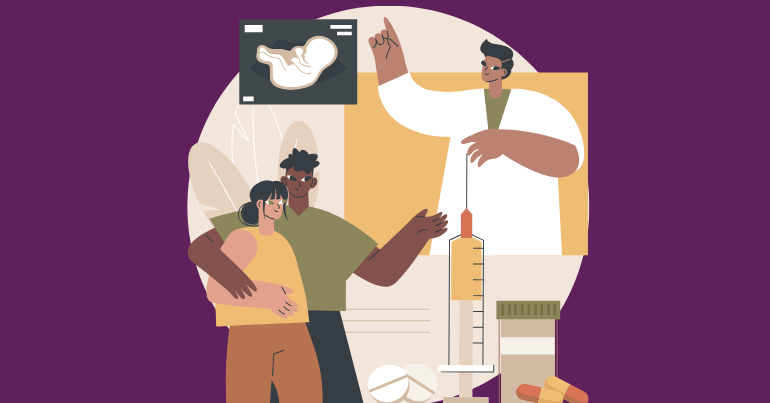
Treatment of male infertility encompasses various options tailored to address specific underlying causes identified through diagnostic evaluations. Depending on the diagnosis, treatments may include lifestyle modifications such as improving diet, quitting smoking, or reducing alcohol intake to enhance sperm health. Medical interventions like hormone therapies can correct hormonal imbalances that affect sperm production.
Surgical procedures may be necessary to treat conditions like varicocele or to repair obstructed reproductive tract issues. Assisted reproductive technologies (ART) such as Intrauterine Insemination (IUI) or In Vitro Fertilization (IVF) offer viable options for couples struggling with severe male infertility issues. Each treatment approach aims to optimize sperm quality and increase the chances of successful conception, guided by individual circumstances and medical advice.
Recognizing Signs of Male Fertility
Recognizing signs a man is fertile involves understanding key indicators of reproductive health and sperm quality. One significant sign is a normal sperm analysis, which includes parameters like sperm count, motility (ability to swim), and morphology (shape). High sperm count and excellent motility are crucial for sperm to reach and fertilize an egg successfully. Other signs include overall good health, absence of reproductive disorders or infections, and normal sexual function. Regular medical check-ups and fertility assessments can provide valuable insights into a man’s fertility status and help identify any potential issues early on, improving chances of conception.
Conclusion:-
Understanding male fertility factors and their impact on semen analysis is essential for addressing infertility issues. By recognizing the common causes—ranging from lifestyle choices to health conditions and environmental factors—men can take proactive steps toward improving their reproductive health. Consultation with a male factor fertility specialist, such as those at Nimaaya IVF Center, can provide the guidance and treatment necessary to overcome infertility challenges. Whether through lifestyle modifications, medical interventions, or assisted reproductive technologies, there are many avenues to explore in the journey toward fatherhood. Remember, while some forms of male infertility may be permanent, many can be treated or managed effectively, offering hope to many couples.
-:FAQs:-
Is male infertility permanent, or can it be treated?
While some forms of male infertility may be permanent, many cases can be treated or managed effectively through lifestyle changes, medical interventions, or assisted reproductive technologies. Seeking advice from a male fertility specialist can offer tailored counsel.
Can male infertility be cured?
Male infertility can often be treated successfully depending on the underlying cause, through interventions such as lifestyle changes, medical treatments, or assisted reproductive technologies (ART). Consulting with a fertility specialist can provide personalized strategies to improve fertility outcomes.
What are the treatment options available for male infertility?
Treatment of male infertility includes lifestyle changes, medical interventions like hormone therapies and surgical procedures, and advanced reproductive technologies such as IVF and IUI. The choice of treatment depends on the specific underlying causes identified through diagnostic evaluations.
How can stress impact male fertility?
Chronic stress and anxiety can disrupt hormonal balance, reduce sperm production, and impair sperm quality. Managing stress through relaxation techniques, exercise, and counseling can potentially improve fertility outcomes.
What role does age play in male fertility?
While female age is often discussed regarding fertility, male fertility can also decline with age. Advanced paternal age may increase the risk of genetic abnormalities in sperm and impact fertility potential. Consulting with a fertility specialist can provide insights into age-related fertility considerations and potential treatment options.
Are there natural supplements or vitamins that can boost male fertility?
Certain supplements and vitamins, such as antioxidants (Vitamin C, Vitamin E, Coenzyme Q10), zinc, and folic acid, have been shown to support sperm health and fertility. However, it’s essential to consult with a healthcare provider before starting any supplements, as individual needs and underlying health conditions vary.
How can I maintain my fertility health as I age?
As men age, maintaining fertility health becomes increasingly important. Adopting a healthy lifestyle, including regular exercise, a balanced diet rich in antioxidants and essential nutrients, avoiding excessive alcohol and tobacco use, and managing stress effectively, can support optimal sperm production and overall reproductive health. Regular fertility check-ups can also monitor any changes in sperm parameters over time.

